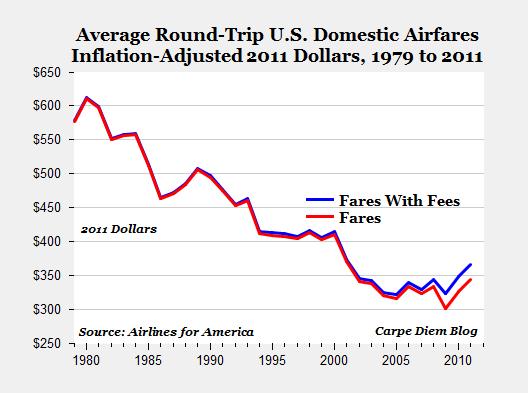People want top-tier service, but repeatedly refuse to pay for it when options are there.
Should airlines be regulated once again? That would mean higher levels of service, guaranteed seats, guaranteed jobs (and profits), but at higher costs for consumers.
The market has driven a race to the bottom, but is the market rational in this case? Should it get what it wants? Or it is the result of millions of individuals all looking out for their own best interest at the cost of the quality of the overall system?
Source:
http://www.msn.com/en-us/travel/news/airline-service-you-get-what-you-pay-for/ar-BBAWFwh
Should airlines be regulated once again? That would mean higher levels of service, guaranteed seats, guaranteed jobs (and profits), but at higher costs for consumers.
The market has driven a race to the bottom, but is the market rational in this case? Should it get what it wants? Or it is the result of millions of individuals all looking out for their own best interest at the cost of the quality of the overall system?
Cheaper tickets were the primary motivation for the 1978 Airline Deregulation Act, a bill spearheaded by former Senator Ted Kennedy (D-Mass.) and implemented by Kahn, who became CAB Chairman. The 1978 law has delivered what was promised. Adjusted for inflation, average airfares are almost 40 percent lower than in 1979, including fees for checked bags and the like.
Apart from electronics, almost no other familiar good or service can claim that kind of result. Almost 90 percent of all adult Americans have flown, and nearly 50 percent have flown during the last 12 months. We have democratized travel once available only to the rich.
Consumer demand, not airline conspiracy, has produced the current economy-class layout. Back in 2000, American Airlines reconfigured all 700 of its jets to provide "More Room throughout Coach." In order to make the initiative revenue-neutral, American sought to charge roughly 2-percent more per ticket. The "More Room" initiative failed; people loved the space, but would not pay a few bucks for it.
Since then, airlines have split the coach cabin and now charge a premium to the small group that prefers more space. This and other "unbundling" of airfares has increased revenues, while giving people choices that airline market research continually tells us customers want.
Politicians and cranky media tell us that "bumping" (involuntary denied boarding) happens all the time, but last year the Department of Transportation (DOT) reported just over 44,000 bumpings out of nearly 660 million passengers, or 0.62 per 10,000 passengers. To understand how small a percentage that is, think of it this way: If you flew one flight every day, it would be 44 years before you would get bumped.
Airlines cannot ignore the Washington sentiment, which has been made clear in hearings in House and Senate committees last week. Sympathetic members like Rep. Bill Shuster (R-Pa.) warned carriers to improve or face some form of re-regulation.
Even former American Airlines CEO Bob Crandall, one of the most successful airline executives after deregulation, recently said, "Airlines have become very much like utilities essential to all, akin to electricity and telecommunications providers, and an appropriate mix of regulation and free-market principles ought to be used to limit potential abuses."
Source:
http://www.msn.com/en-us/travel/news/airline-service-you-get-what-you-pay-for/ar-BBAWFwh


